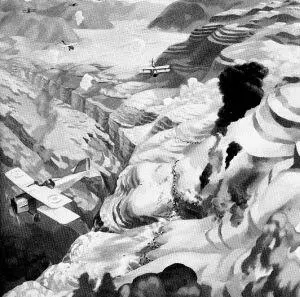Table of Contents
However, the Arab Movement lived on Allenby's good pleasure, so it was needful to undertake some operation, less than a general revolt, in the enemy rear: an operation which could be achieved by a raiding party without involving the settled peoples; and yet one which would please him by being of material help to the British pursuit of the enemy. These conditions and qualifications pointed, upon consideration, to an attempted cutting of one of the great bridges in the Yarmuk Valley.
It was by the narrow and precipitous gorge of the Biver Yarmuk that the railway from Palestine climbed to Hauran, on its way to Damascus. The depth of the Jordan depression, and the abruptness of the eastern plateau-face made this section of the line most difficult to build. The engineers had to lay it in the very course of the winding river-valley: and to gain its development the line had to cross and recross the stream continually by a series of bridges, the farthest west and the farthest east of which were hardest to replace.
To cut either of these bridges would isolate the Turkish army in Palestine, for one fortnight, from its base in Damascus, and destroy its power of escaping from Allenby's advance. To reach the Yarmuk we should need to ride from Akaba, by way of Azrak, some four hundred and twenty miles. The Turks thought the danger from us so remote that they guarded the bridges insufficiently.
Accordingly we suggested the scheme to Allenby, who asked that it be done on November the fifth, or one of the three following days. If it succeeded, and the weather held up afterwards for a fortnight, the odds were that no coherent unit of von Rress's army would survive its retreat to Damascus. The Arabs would then have their opportunity to carry their wave forward into the great capital, taking up at the half-way point from the British, whose original impulse would then be nearly exhausted, with the exhaustion of their transport.
For such an eventuality we needed at Azrak an authority to lead the potential local adherents. Nasir, our usual pioneer, was absent: but out with the Beni Sakhr was Ali ibn el Hussein, the youthful and attractive Harith Sherif, who had distinguished himself in Feisal's early desperate days about Medina, and later had out-newcombed Newcombe about el Ula.
Ah', having been Jemal's guest in Damascus, had learned something of Syria: so I begged a loan of him from Feisal. His courage, his resource, and his energy were proven. There had never been any adventure, since our beginning, too dangerous for Ali to attempt, nor a disaster too deep for him to face with his high yell of a laugh.
He was physically splendid: not tall nor heavy, but so strong that he would kneel down, resting his forearms palm-up on the ground, and rise to his feet with a man on each hand. In addition, Ali could outstrip a trotting camel on his bare feet, keep his speed over half a mile and then leap into the saddle. He was impertinent, headstrong, conceited; as reckless in word as in deed; impressive (if he pleased) on public occasions, and fairly educated for a person whose native ambition was to excel the nomads of the desert in war and sport.
Ali would bring us the Beni Sakhr. We had good hopes of the Serahin, the tribe at Azrak. I was in touch with the Beni Hassan. The Rualla, of course, at this season were away at their winter quarters, so that our greatest card in the Hauran could not be played. Faiz el Ghusein had gone into the Lejah to prepare for action against the Hauran Railway if the signal came. Explosives were stored in desirable places. Our friends in Damascus were warned; and Ah' Riza Pasha Rikabi, the city's military governor for the innocent Turks, and at the same time chief agent and conspirator for the Sherif, took quiet steps to retain control if the emergency arose.
My detailed plan was to rush from Azrak, under guidance of Rafa (that most gallant sheikh who had convoyed me in June), to Um Keis, in one or two huge marches with a handful of, perhaps, fifty men. Um Keis was Gadara, very precious with its memories of Menippus and of Meleager, the immoral Greek-Syrian whose self-expression marked the highest point of Syrian letters. It stood just over the westernmost of the Yarmuk bridges, a steel masterpiece whose destruction would fairly enrol me in the Gadarene school. Only half a dozen sentries were stationed actually on the girders and abutments. Reliefs for them were supplied from a garrison of sixty, in the station buildings of Hemme, where the hot springs of Gadara yet gushed out to the advantage of local sick. My hope was to persuade some of the Abu Tayi under Zaal to come with me. These men-wolves would make certain the actual storming of the bridge. To prevent enemy reinforcements coming up we would sweep the approaches with machine-guns, handled by Captain Bray's Indian volunteers from the cavalry division in France, under Jemadar Hassan Shah, a firm and experienced man. They had been months up country, rail-cutting, from Wejh, and might fairly be assumed to have become experts on camel-back, fit for the forced marches in prospect.
The demolition of great underslung girders with limited weights of explosive was a precise operation, and demanded a necklace of blasting gelatine, fired electrically. The humber made us canvas straps and buckles, to simplify the fixing. None the less, the job remained a difficult one to do under fire. For fear of a casualty, Wood, the base engineer at Akaba, the only sapper available, was invited to come along and double me. He immediately agreed, though knowing he had been condemned medically for active service as the result of a bullet through the head in France. George Lloyd, who was spending a last few days in Akaba before going to Versailles on a regretted inter-allied Commission, said that he would ride up with us to Jefer: as he was one of the best fellows and least obtrusive travellers alive, his coming added greatly to our forlorn anticipation.
 Turk Troops Bombed in Wadi Fara
Turk Troops Bombed in Wadi Fara
We were making our last preparations when an unexpected ally arrived in Emir Abd el Kader el Jezairi, grandson of the chivalrous defender of Algiers against the French. The exiled family had lived in Damascus for a generation. One of them, Omar, had been hanged by Jemal for treason disclosed in the Picot papers. The others had been deported, and Abd el Kader told us a long story of his escape from Brusa, and his journey, with a thousand adventures, across Anatolia to Damascus. In reality, he had been enlarged by the Turks upon request of the Khedive Abbas Hilmi, and sent down by him on private business to Mecca. He went there, saw King Hussein, and came back with a crimson banner, and noble gifts, his crazy mind half-persuaded of our right, and glowing jerkily with excitement.
To Feisal he offered the bodies and souls of his villagers, sturdy, hard-smiting Algerian exiles living compactly along the north bank of the Yarmuk. We seized at the chance this would give us to control for a little time the middle section of the Valley railway, including two or three main bridges, without the disability of raising the country-side; since the Algerians were hated strangers and the Arab peasantry would not join them. Accordingly, we put off calling Rafa to meet us at Azrak, and said not a word to Zaal, concentrating our thoughts instead on Wadi Khalid and its bridges.
While we were in this train of mind arrived a telegram from Colonel Bremond, warning us that Abd el Kader was a spy in pay of the Turks. It was disconcerting. We watched him narrowly, but found no proof of the charge, which was not to be accepted blindly, as from Bremond, who was more a liability than our colleague; his military temper might have carried away his judgement when he heard Abd el Kader's outspoken public and private denunciations of France. The French conception of their country as a fair woman lent to them a national spitefulness against those who scorned her charms.
Читать дальше

 Turk Troops Bombed in Wadi Fara
Turk Troops Bombed in Wadi Fara










